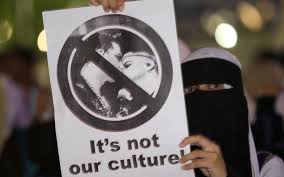
Category: justice
Chaos Worship Is The 21st Century Manifestation of Slave Morality

Looming over the world stage of today is a shaky alliance of groups who not only appear to have little in common, but whose goals appear to be directly antithetical to each other. There is, however, a unifying tenet within this group of people: that order is inherently bad. In other words, they are chaos worshippers.
On the surface of things, it’s not obvious what a homosexual rights activist might have in common with a Muslim. Homosexuals are hated by Muslims; the Koran and hadith make it clear that homosexual acts are sins deserving of punishment.
Indeed, in all of Afghanistan, Brunei, Iran, Iraq, Mauritania, Nigeria, Saudi Arabia, Sudan, United Arab Emirates and Yemen, homosexual activity carries the death penalty.
Nor is it obvious what either of these groups have in common with communists. Both Islam and homosexuality were heavily suppressed by the Soviet Union, with adherents of either practice regularly shipped off to the gulags.
So what is the basis of this modern alliance of homosexuals, Muslims and communists?
The answer lies in what Nietzsche called slave morality. In particular, it is the resentment of the weaklings towards the strong that have seen those weaklings put their differences aside (or at least pretend to) and unite against The Man.
A similar phenomenon can be observed in chimpanzee troops, where weaker males sometimes come together in order to take out an individual stronger male.
Essentially what many individuals in these groups have in common is a grudge against the current order of things.
Homosexuals want to be treated with the same respect as heterosexuals, but they never will be because their sexual orientation does not maintain the existence of the human species.
Muslims want to be treated with the same respect as non-Muslims, but they never will be because the moral principles at the foundation of their religion lead inevitably to segregation, mistrust and violence.
Communists want to be treated with the same respect as those of other political orientations, but they never will be because their philosophy expresses a contempt for individual human life that the majority of people consider abhorrent.
Because all three of these groups have found themselves in a position of weakness, on account of that all three of them have been shunned for expounding a way of life that is detrimental to the human survival project, they have found cause to unite around their common resentment of the current order.
Their resentment is so great (this being the outwards projection of their immense self-hatred) that they have no interest in modifying or refining this order.
What they want is simply to destroy it. Whether or not a better order will arise after this act of destruction is not important. The overall goal is to destroy the current order.
In other words, many individuals in these groups are chaos worshippers.
Chaos worshippers don’t believe in correct order. To a worshipper of chaos, all order is bad because it is all oppressive. Thus, any individual or group serving to maintain that order is the enemy, no matter who they are or for what reason they maintain order.
Sometimes the chaos worshipper goes as far as to disbelieve in concept of order at all. This can manifest as a refusal to believe in the march of history.
Some chaos worshippers believe that the laws of human psychology that have led to the march of history no longer apply, or that things will be different this time. As a result they refuse to learn anything from history, mindlessly insisting that the world can be made into a paradise merely through sufficient adherence to an ideology.
One disastrous consequence of this attitude has been the European decision to let in tens of millions of Muslim immigrants in the belief that they would all decide to fit in to the local culture and essentially become Europeans with slightly swarthier skin.
The reality is that mass immigration of anyone to a foreign locale almost never benefits the locals, as is plainly obvious to anyone who has studied any amount of history.
This is irrelevant to the chaos worshipper, for whom mass immigration has the benefit of destroying existing social bonds at all of the local, national and super-regional levels.
In other words, mass immigration of obviously incompatible cultures is great because it spreads chaos. This is why chaos worshippers universally support it.
After all, if you are a pathetic loser at the bottom of society, then all order is bad. All order is oppressive. All order is necessarily immoral. All order is “keeping you down”.
So for these losers, enslaved not by chains of iron but by chains of silver and gold, destruction for destruction’s sake has become its own imperative.
This is the form that slave morality has taken in the 21st century.
Latest Frontiers in the War on Free Speech in the West

Free speech is the foundation of civilisation. Without it, it’s not possible for a person to express their discontent with the way things are, and without an outlet for discontent it will inevitably turn into violence. As John F Kennedy told us, “Those who make peaceful revolution impossible will make violent revolution inevitable.”
There are powerful political movements in the world today who have calculated that criminalising free speech benefits their agenda, despite this risk. These movements usually have a kind of feminine logic at their core, in that they consider themselves to be righteously resisting masculine excesses like discrimination.
Most are predicated on the moral assumption that, in any conflict between two forces, the weakest force must automatically be the morally correct one, on the grounds that the weaker side would not start a conflict that they would lose.
After some decades of percolating away in sick heads disconnected from reality, this assumption has led the social justice warriors to now believe in the moral imperative of destroying all hierarchy on the grounds that it is necessarily masculine and therefore inherently evil.
No consideration is given to the concept of correct hierarchy that leads to good order – such a thing is simply axiomatically defined as impossible. All order is bad, therefore all must be destroyed.
Such a morality naturally leads to the idea that all weakness is inherently good – hence the resurgence of what Nietzsche would have called “slave morality” in the West.
This explains why so many are bleating the catchphrase of the modern moron: “Hate speech is not free speech” – where hate speech is defined as the promulgation of facts that, despite being true, are politically inconvenient to those who are anti-hierarchy.
In particular, any fact which suggests that a particular hierarchy might be natural and inevitable has to be the most strenuously opposed. As Nietzsche pointed out, the reason for this is the resentment that these weaklings have towards those strong enough to impose good order upon themselves, for it is good order imposed upon oneself that leads to rising in worldly hierarchies.
For instance, the proposition that the text of the Koran will lead inevitably to violence is vociferously opposed by those who want to propagate the impression that the wars in the Middle East are caused primarily by Western interference.
Likewise, the proposition that Islamic terrorism in Europe is a natural consequence of the text of the Koran is opposed by those who want to propagate the impression that the terrorism is blowback for Western interference.
Unsurprisingly, such propositions – entirely independent of any historical or logical validity they might have – are increasingly lumped under the general rubric of “Islamophobia.”
They join propositions such as statements about racial differences in intelligence, or about gender differences in propensity towards certain patterns of behaviour, as politically incorrect ones.
The latest frontier in the war on free speech is attempts to criminalise the free expression of such propositions.
Already there is a concerted movement that means to make it illegal to point out the obvious connection between Koranic verses calling for violence and Islamic expressions of violence, or the obvious connection between the belief that a paedophile was the perfect man and culturally lax attitudes to paedophilia.
The tragedy is, the only reason why the West is no longer an oppressive shithole like the Islamic World is that we have spent the last four centuries using our freedom of speech and expression to destroy the evil of Abrahamism in its manifestation of Christianity.
And, in much the same way that the West was an oppressive, miserable shithole when it was illegal to criticise Christianity, so too will it be an oppressive, miserable shithole when it is illegal to criticise Islam.
What has to happen is a cultural shift where screaming “Racist!” or “Bigot!” at someone is no longer socially sanctioned as legitimate discourse. There needs to be a mass awakening to the fact that this strategy of political manipulation has the overall effect of suppressing honest discussion, and therefore is detrimental to everyone in society, and to society as a whole.
This will require sane people uniting around the spirit of genuine inquiry into the nature of reality, and in opposition to the egomaniacs who are trying to remake the world in their image by force.
And that means uniting around a shared appreciation that free speech keeps us safe from all kinds of excesses, even politically correct ones.
After all, it’s not a coincidence that the Anglosphere, with the strongest cultural appreciation of the value of free speech, has kept itself safe from totalitarianism for the longest time.
The Only Reason to Still Oppose Medicinal Cannabis is Sadism
The New Zealand Parliament will soon get another chance to bring our cannabis laws into the 21st century, with Julie Anne Genter’s Misuse of Drugs (Medicinal Cannabis and Other Matters) Amendment Bill drawn from the Member’s Bill Ballot this week. This ought to herald the long-awaited national conversation on the subject.
The Bill allows for any Kiwi suffering from “any debilitating condition” to use cannabis or a cannabis product if they have approval from a doctor. It also allows for such patients to cultivate cannabis themselves or to nominate someone to do it for them.
This latter point is extremely important and often underappreciated. One of Peter Dunne’s strategies to keep cannabis illegal by boondoggle has been to restrict supply to extremely expensive overseas sources, such as Sativex (which costs over $1,000 per month), instead of simply allowing people who need it to cultivate it themselves. This Bill would remove this deliberately-placed hurdle.
As Genter points out, the decision to make cannabis illegal was not based on evidence in the first place. Doctors in the 1930s were prescribing medicinal cannabis to patients in New Zealand, as they were all across the world.
The decision to stop doctors from prescribing cannabis was pushed on us by moronic do-gooders forcing their Puritan ideology on the rest of the world.
There was never any science involved, nor any common sense, foresight, empathy, compassion or concern for good order.
From the beginning, cannabis prohibition was based on nothing but a sadistic need to control the masses through causing them suffering, and on the gullibility of legions of morons willing to bleat whatever they heard from an authority figure as if it was the Word of God.
For a person to still not know that cannabis is medicinal they have to be willfully stupid.
The Aotearoa Legalise Cannabis Party first stood in a General Election in 1996. Already in 1996 the party platform had the need for medicinal cannabis as one of its core tenets.
In 1996 it got 1.66% of the vote, so even twenty years ago it was true that one in sixty Kiwis considered cannabis law reform a major issue. After all, California legalised medicinal cannabis that year, so the medicinal properties of cannabis were already known and accepted by experts even then.
Since then, twenty-eight US states have made medicinal cannabis legal and eight have made recreational cannabis legal – and none of them have gone back to prohibition after making the change.
So to deny that cannabis law reform is inevitable is like denying that a heavyweight boxer who has won forty consecutive knockout victories is a title contender.
For a person to continue to believe that the prohibition of medicinal cannabis helps New Zealanders, they have to possess a willful ignorance that borders on malice.
They would have to continue to ignore all the stories from hundreds of medicinal cannabis users, over twenty years, in which they detailed the reduction in suffering that cannabis gave them.
They would have to think nothing of the fact that supporters of medicinal cannabis are winning a victory every month either in New Zealand or in another Western jurisdiction.
They would have to believe that it was fair that any of Martin Crowe, Paul Holmes and Helen Kelly could have been prosecuted and sent to prison for using medicinal cannabis to alleviate pain caused from dying of cancer.
And a person cannot think like that unless they purposefully deny reality for the sake of bringing cruelty into the world.
When the debate about medicinal cannabis does, finally, after over twenty years of campaigning, happen in Parliament, the MPs who oppose it will mark themselves out as particularly sadistic old dinosaurs who need getting rid of.
